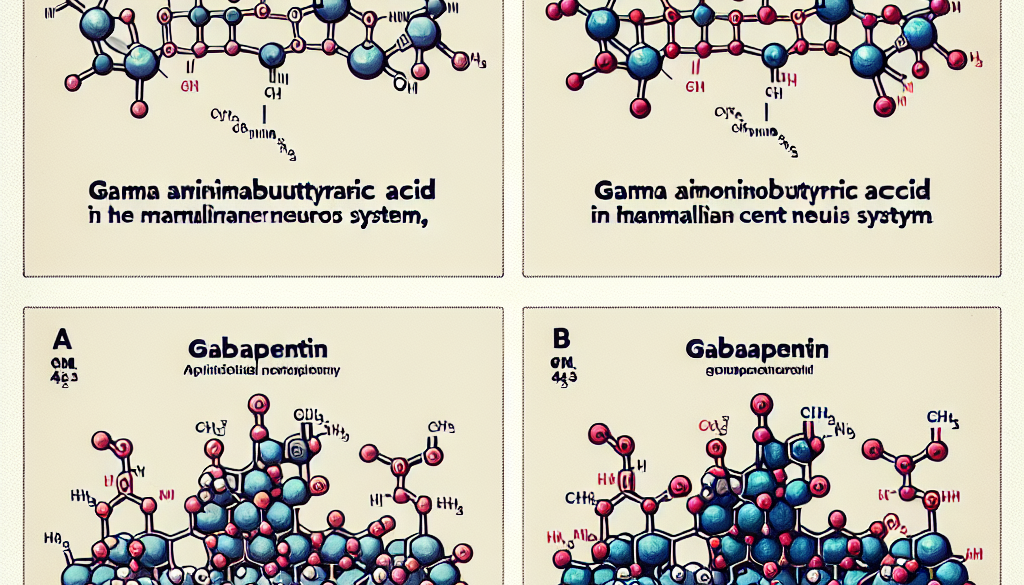Is Gamma Aminobutyric Acid the Same as Gabapentin?
-
Table of Contents
Is Gamma Aminobutyric Acid the Same as Gabapentin?
In the realm of neuroscience and pharmacology, substances like Gamma Aminobutyric Acid (GABA) and Gabapentin often come up in discussions due to their significant roles in managing neurological conditions. However, despite their similar-sounding names and some common uses, GABA and Gabapentin are distinctly different in their chemical structure, mechanisms of action, and applications. This article delves into these differences and sheds light on each compound’s unique characteristics.
Understanding Gamma Aminobutyric Acid (GABA)
GABA is a naturally occurring amino acid that functions as a neurotransmitter in the brain. It is primarily known for its inhibitory role in the central nervous system (CNS), where it works to reduce neuronal excitability throughout the nervous system. Here are some key points about GABA:
- Neurotransmitter Function: GABA is the chief inhibitory neurotransmitter in the mammalian central nervous system. It plays a pivotal role in reducing neuronal excitability and helps maintain a balance between nerve transmission.
- Synthesis: GABA is synthesized directly from the amino acid glutamate using the enzyme glutamate decarboxylase.
- Role in the Body: It is involved in muscle relaxation, stress reduction, and a calming effect on the nervous system.
Exploring Gabapentin
Gabapentin, on the other hand, is a pharmaceutical drug that was synthesized to mimic the chemical structure of GABA. It is used primarily to treat neuropathic pain and as an anticonvulsant in various neurological disorders. Here are some important aspects of Gabapentin:
- Chemical Structure: Although Gabapentin resembles GABA structurally, it does not bind directly to GABA receptors or affect GABA uptake or degradation.
- Mechanism of Action: Gabapentin works by binding to the α2δ subunit of voltage-dependent calcium channels in the central nervous system, which helps in reducing the release of excitatory neurotransmitters.
- Uses: It is commonly prescribed for the treatment of epilepsy, neuropathic pain, and fibromyalgia.
Comparative Analysis: GABA vs. Gabapentin
While GABA and Gabapentin may share some similarities in their names and a basic structural resemblance, they are fundamentally different in their action and applications:
- Origin: GABA is a naturally occurring neurotransmitter, whereas Gabapentin is a synthetic compound designed to mimic some of GABA’s effects.
- Function: GABA serves as a neurotransmitter that directly influences nerve transmission, while Gabapentin primarily affects the way calcium channels function in the nervous system.
- Receptor Interaction: GABA interacts with GABA receptors (GABA-A, GABA-B). Gabapentin does not interact with these receptors but instead binds to the calcium channel subunit.
- Therapeutic Uses: GABA is often used in supplement form for its calming effects, whereas Gabapentin is used in medical settings to manage specific neurological disorders.
Applications in Medicine and Health
Both GABA and Gabapentin have their respective places in medical and health applications, albeit in very different contexts:
- GABA Supplements: Often used to promote relaxation, improve mood, and help with sleep.
- Gabapentin Medication: Prescribed for controlling seizures, relieving nerve pain, and sometimes used off-label for anxiety disorders.
Conclusion
In conclusion, while Gamma Aminobutyric Acid and Gabapentin might appear similar at a glance due to their names and basic structural similarities, they are distinctly different substances with unique mechanisms and uses. GABA is a key neurotransmitter that helps regulate brain activity and nerve transmission, offering calming effects. Gabapentin, however, is a synthetic drug used primarily to treat neuropathic pain and epilepsy, operating through a different mechanism by affecting calcium channels in the nervous system. Understanding these differences is crucial for their appropriate application in medical and therapeutic settings.
Explore ETprotein’s High-Quality Protein Products
If you’re looking for top-notch protein supplements, consider ETprotein’s diverse range of products. They offer everything from organic rice protein to exotic options like watermelon seed protein, catering to various dietary needs and preferences. Their products are ideal for enhancing your nutritional intake and supporting your health and wellness goals.
ETprotein is Gamma-Aminobutyric Acid Factory Manufacturer and Supplier in China, Check further information by visiting the Gamma-Aminobutyric Acid Product Page
Gamma-Aminobutyric Acid Product Page
Request Quotation and Samples of Gamma-Aminobutyric Acid from ETprotein
About ETprotein
ETprotein, a reputable protein and elite nutrition ingredients Gamma-Aminobutyric Acid Chinese factory manufacturer and supplier, is renowned for producing, stocking, exporting, and delivering the highest quality organic bulk vegan proteins and elite nutritional ingredients Gamma-Aminobutyric Acid. They include Organic rice protein, clear rice protein, pea protein, clear pea protein, watermelon seed protein, pumpkin seed protein, sunflower seed protein, mung bean protein, peanut protein. Their offerings, characterized by a neutral taste, non-GMO, allergen-free attributes, cater to a diverse range of industries. They serve nutraceutical, pharmaceutical, cosmeceutical, veterinary, as well as food and beverage finished product distributors, traders, and manufacturers across Europe, USA, Canada, Australia, Thailand, Japan, Korea, Brazil, and Chile, among others.
ETprotein specialization includes exporting and delivering tailor-made protein powder and finished nutritional supplements. Their extensive product range covers sectors like Food and Beverage, Sports Nutrition, Weight Management, Dietary Supplements, Health and Wellness Products, and Infant Formula, ensuring comprehensive solutions to meet all your protein needs.
As a trusted company by leading global food and beverage brands and Fortune 500 companies, ETprotein reinforces China’s reputation in the global arena. For more information or to sample their products, please contact them and email sales(at)ETprotein.com today.












